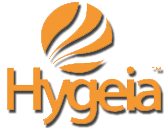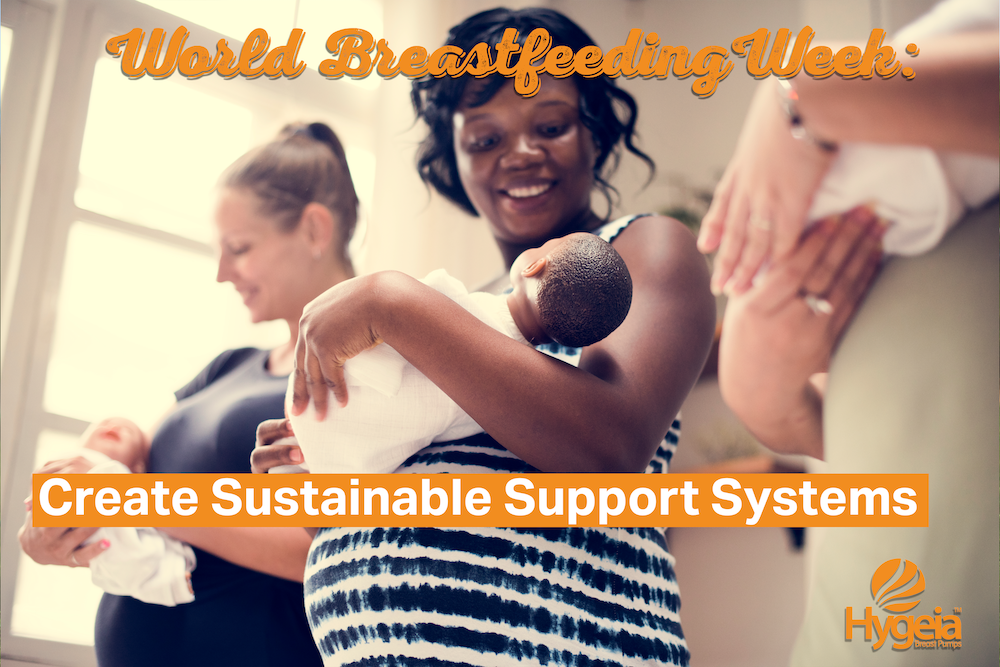
The most common word used to describe breastfeeding is “natural”. This act shared between mother and baby reflects the beauty found in the natural role of motherhood. “Natural” also reflects why breastfeeding needs prioritized in today’s world. Breastfeeding is a natural solution and therefore a sustainable one. World Breastfeeding Week 2025 inspires us to look beyond the immediate act of feeding and consider a much bigger picture. This blog post will dive into the this year’s theme: “Prioritize Breastfeeding: Create sustainable support systems.”
The Environmental Toll of Artificial Feeding
Hygeia is in full support of all mother’s and how they choose to feed their babies, be it breastfeeding or formula. Fed is best. No questions. This is truly the most important thing for every baby and that every mom knows what is best for her and her baby.
However, it is important to recognize that the environmental impact of artificial feeding is considerable. The entire process of formula production is energy-intensive and resource-heavy. From sourcing ingredients to manufacturing, packaging, and global distribution, it is a far cry from a “natural renewable food” like breast milk. One one hand, breast milk is environmentally safe and produced and delivered to the consumer without pollution, packaging, or waste. Artificial milk options demand significant amounts of electricity, fuel for transportation, and water for processing and cleaning. The waste generated, from non-recyclable containers to discarded formula, places a heavy burden on our planet’s ecosystems.
Building Sustainable Support Systems
Recognizing breastfeeding’s vital role in a sustainable future isn’t enough. We must create robust and sustainable support systems for families. There are numerous ways this can be done.
- Community Support: Grass roots is where all things begin. Fostering networks of lactation consultants, peer support groups, and family encouragement are necessary for normalizing breastfeeding. At Hygeia, we offer lactation support in partnership with Nest Collaborative. These virtual breastfeeding consults are accessible anytime, anywhere, and covered by most insurance plans.
- Workplace Policies: For breastfeeding to be normalized there must be support in the workplace. This will happen through advocacy for comprehensive paid maternity leave and flexible work arrangements. Additionally, moms need dedicated breastfeeding-friendly environments with clean, private lactation spaces.
- Healthcare System: The support and education must begin from day one for mothers. We must ensure that healthcare providers are well-trained in lactation support. Facilities must also adhere to best practices like the Baby-Friendly Hospital Initiative.
- Policy and Advocacy: Globally, we must endorse policies that protect, promote, and support breastfeeding. This includes strict adherence to the International Code of Marketing of Breast-milk Substitutes to counter misleading marketing.
- Changing the Narrative: All of these steps will play a part, but individuals must also work to normalize breastfeeding in all settings. Encourage a mom who is breastfeeding in public. Educate a friend on her public breastfeeding rights. Help dismantle any lingering stigma around breastfeeding.
Breastfeed
At Hygeia, we believe that empowering mothers is the first step toward a more sustainable future. By providing you with access to our high-quality breast pumps, we aim to make breastfeeding a comfortable and efficient experience. Every journey is unique, which is why we’re dedicated to helping you get your pump 100% covered by your insurance plan. We are removing financial barriers to this natural choice.
Supporting a mother is an act of environmental stewardship. By strengthening the systems around us—from our communities to our workplaces—we can make breastfeeding a realistic option for more families. It’s an investment in a healthier tomorrow, for our children and for our planet. Therefore, join us in championing this natural, sustainable solution during World Breastfeeding Week.
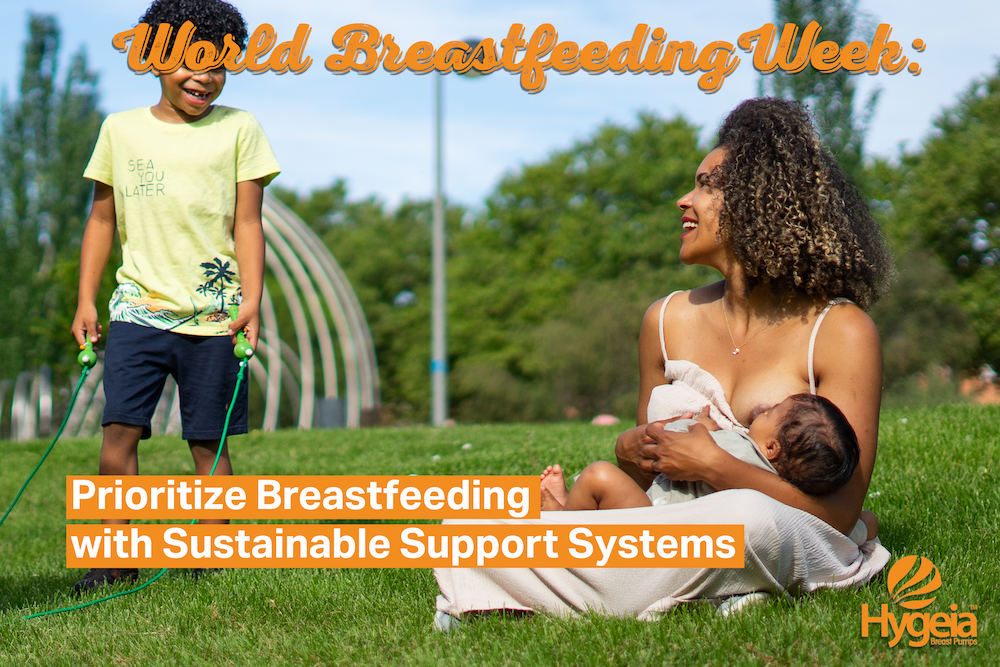
Imagine a single act that nourishes a baby, empowers a mother, and protects our planet. This World Breastfeeding Week 2025, we’re doing more than celebrating infant feeding; we’re championing a powerful solution for our planet’s future. From August 1st to 7th, the #WBW2025 campaign will shine a crucial spotlight on the profound connection between breastfeeding, environment, and climate change, urging all to “Prioritize Breastfeeding: Create Sustainable Support Systems.”
The world is in the trenches of era where environmental concerns dominate global conversations. Hygeia will always support mothers in finding the best solution for their personal situation and seeing to it that baby is fed and mother is healthy. However, at Hygeia, we also know it is vital to recognize breastfeeding as a key player in fostering a sustainable environment and actively reducing the impact of climate change caused by artificial feeding.
The Green Power of Breastfeeding
Breast milk is often called nature’s perfect food, but its environmental benefits are equally remarkable.
Reduced Carbon Footprint
Unlike infant formula, breastfeeding boasts a significantly lower carbon footprint. It requires no industrial manufacturing processes, factories, or energy-intensive machinery that release greenhouse gas emissions. Furthermore, breast milk is the ultimate local food; it requires no transportation, eliminating the emissions associated with shipping ingredients or finished products across vast distances.
Waste Reduction
Breastfeeding is a champion of waste reduction. It produces absolutely zero waste – no plastic bottles, no metal cans, no paper packaging to end up in landfills. Breastfeeding also significantly reduces water consumption. There’s no need for water to prepare formula or sterilize bottles, conserving this precious resource. While a breastfeeding mother needs to stay hydrated, this is a natural biological need, not an industrial demand.
Conservation of Resources
Breastfeeding lessens our reliance on industrial agriculture, particularly the dairy industry. Most formulas are cow’s milk-based, an industry known for its contribution to methane emissions from livestock, extensive land degradation for grazing, and massive water usage. By choosing breastfeeding, we indirectly support resource conservation and the protection of biodiversity, promoting more sustainable practices overall.
Championing the Natural Solution
This World Breastfeeding Week 2025, let’s come together to champion this incredible, natural solution. At Hygeia Health, we are dedicated to empowering mothers through high-quality breast pumps and comprehensive support. Our products are designed to make breastfeeding more comfortable and efficient, while our resources provide valuable information and guidance.
By prioritizing breastfeeding and building strong, lasting support systems, we’re not just investing in the health and well-being of our children; we’re taking meaningful climate action and fostering a truly sustainable environment for future generations. Every ounce of breast milk is a drop in the ocean of positive change.
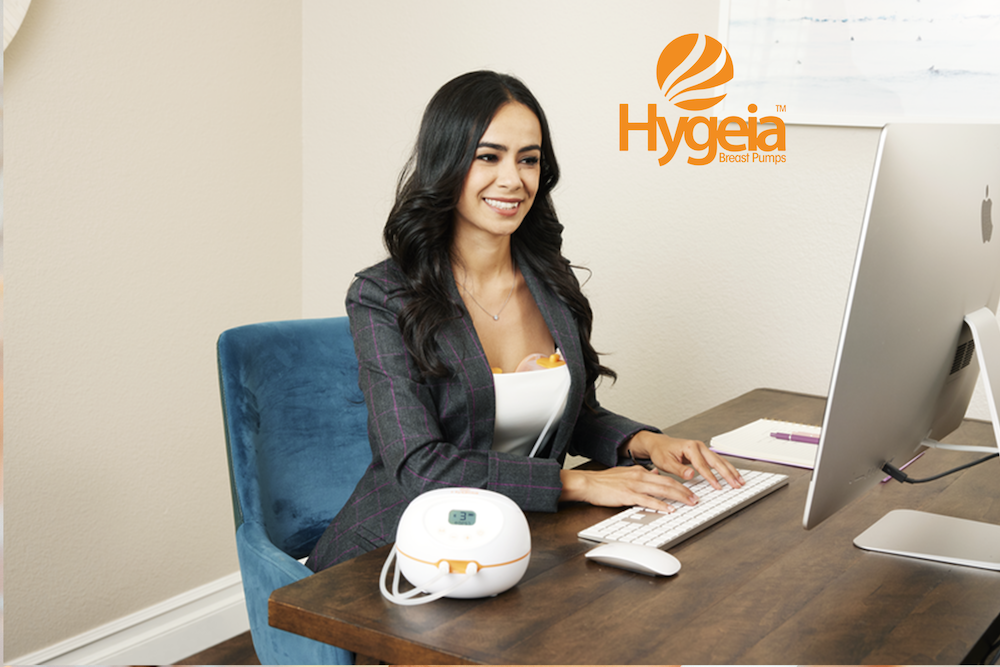
The idea of it may feel intimidating, but pumping at work doesn’t have to be stressful. With a little organization and the right tools, you can make it a seamless part of your day.
In this blog post we will walk you through the process of taking on the challenge and creating a smooth experience of pumping at work.
Planning your work/pump flow
Workplace Support: Talk to your employer about your need to pump at work. Many workplaces are required to provide a private space for breastfeeding mothers. You may also be able to take breaks to pump.
Pumping Schedule: It’s important to establish a pumping schedule that works for you and your baby. Aim to pump every 2-3 hours while you’re at work. If your baby is still breastfeeding frequently, you may need to pump more often.
Creating a comfortable environment
Find a Private Space: If your employer doesn’t provide a designated lactation room, seek out a private space where you’ll feel comfortable pumping. This might be a conference room, a private office, or even your own office if you can arrange to be undisturbed. Consider suggesting to your employer that they designate a lactation space for all nursing mothers. This could benefit not only you but also future employees.
Set Up Your Pumping Station: Once you’ve found a private space, set up your pumping station. You’ll need your breast pump, bottles, and a cooler for storing your milk. If your pump requires plugging in, make sure you have a comfortable seat near an outlet. For added comfort, bring a blanket or pillow. And don’t forget to stay hydrated by drinking plenty of water while breastfeeding.
Taking care of your milk
Expressing Milk: Expressing milk can take practice. If you’re struggling to express milk efficiently, especially while pumping at work, a lactation consultant can help you master the proper technique.
Storing Breastmilk: Properly storing breast milk is essential. Store it in a clean container labeled with the date. For extended storage, an insulated cooler with ice packs is ideal. If you have access to a refrigerator at work, you can store your pumped milk there for up to 48 hours. Place it in the back of the refrigerator, where it’s coldest.
Hygeia Health Can Help
At Hygeia Health, we understand the challenges that working mothers face. Our high-quality breast pumps are designed to make pumping easier and more efficient.
We also offer resources and support to help mothers on their breastfeeding journey. Our website provides information on breastfeeding and pumping, and our customer service team is available to answer your questions.
You Can Do It
Pumping at work can be a challenge, but it’s definitely possible. We believe that every mother should have access to the tools and support they need to breastfeed their baby. That’s why we offer 100% insurance-covered breast pumps to qualified mothers.
To apply for a free breast pump, simply visit our website and fill out the application form. We’ll review your application and contact you with the next steps.

With the year winding down, it’s a great time to celebrate the key breastfeeding milestones of 2024. We saw a surge in society’s understanding of the profound impact of breastfeeding. From groundbreaking research on the transfer of antibodies through breast milk to a renewed focus on supporting mothers’ mental health, it was a year of significant advancements.
Here’s a look at some of the key developments and top breastfeeding stories of 2024:
Mental Health Focus
The connection between breastfeeding and maternal mental health gained significant attention. Research emphasized the positive impact of breastfeeding on postpartum mood, reducing the risk of postpartum depression and anxiety.
Advocacy for Breastfeeding Support
2024 saw a renewed focus on improving access to breastfeeding support for all mothers. This included initiatives to increase access to lactation consultants, expand paid maternity leave policies, and create more breastfeeding-friendly workplaces.
Celebrity Advocacy
Many celebrities openly shared their breastfeeding journeys on social media, normalizing the experience and inspiring other mothers. This helped break down the stigma surrounding breastfeeding and encouraged open conversations about the challenges and triumphs of motherhood.
COVID-19 Boosters and Breast Milk
Research continued to highlight the incredible benefits of breastfeeding, particularly in the wake of the COVID-19 pandemic. Studies demonstrated that mothers who received COVID-19 booster shots passed along critical antibodies to their babies through breast milk, providing crucial protection against the virus.
Hygeia Improves and Innovates
Hygeia Health achieved a significant milestone in 2024 with the launch of the Hygeia Express breast pump, honored as the “2024 Product of the Year” by babyMaternity Magazine. This recognition underscores our commitment to empowering mothers on their breastfeeding journeys. As part of this commitment, we continue to innovate and expand our offerings. In addition to the Hygeia Express, we introduced a new line of maternity garments designed to provide comfort and support throughout pregnancy.
Looking to 2025
2024 was a year of progress in understanding the profound benefits of breastfeeding. By continuing to support mothers and advocate for breastfeeding-friendly policies, we can ensure that every mother has the resources and support she needs to successfully breastfeed her baby. We look forward to continuing to serve mothers in 2025.
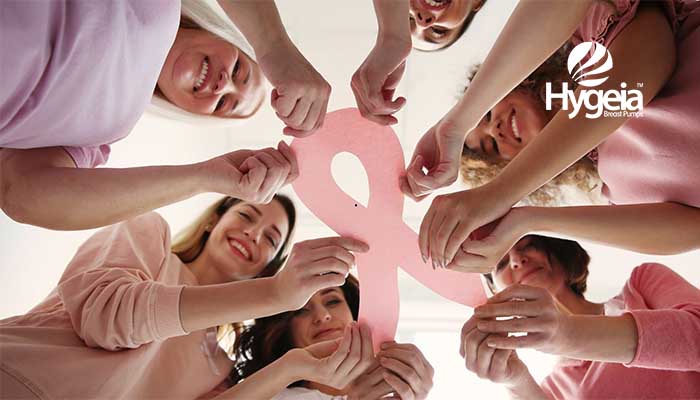
October is Breast Cancer Awareness Month, a time to raise awareness about this serious disease that has impacted nearly all of our lives in one way or another. Breastfeeding has been linked to a reduced risk of breast cancer, making it an important topic for women of all ages, but there is more to know about early detection and risk factors.
What is breast cancer?
Breast cancer is a disease that occurs when cells in the breast grow abnormally and divide uncontrollably. It can affect both men and women, but it is most common in women. It can occur at any age but it is seen in women above the age of 40 years most frequently.
Do you know the signs and symptoms?
Early detection is key to successful treatment of breast cancer. If you notice any of the following changes in your breasts, see your doctor:
- A lump or thickening in the breast or underarm
- A change in the size, shape, or texture of the breast
- Nipple discharge (other than breast milk)
- Skin changes on the breast, such as dimpling, puckering, or redness
- Pain in the breast
What are the risk factors?
Several factors can increase your risk of developing breast cancer, including:
- Age: The risk of breast cancer increases with age
- Family history: Having a close relative with breast cancer can increase your risk.
- Genetics: Certain genetic mutations, such as BRCA1 and BRCA2, can increase your risk.
- Hormone therapy: Taking hormone replacement therapy after menopause can increase your risk.
- Breast lumps: Women who have had some type of non-cancerous breast lumps are more likely to develop cancer later on.
- Dense breast tissue: Women with dense breast tissue have a higher chance of developing breast cancer.
- Obesity: Being overweight or obese can increase your risk.
- Diet & Lifestyle choices: Women who smoke, eat a high-fat diet, and drink alcohol are more at risk of developing breast cancer.
- Radiation exposure: Frequent exposure to X-rays and CT scans may raise a woman’s chance of developing breast cancer.
Breastfeeding and Breast Cancer
Studies have shown that breastfeeding can reduce your risk of developing breast cancer. The longer you breastfeed, the greater the protection.
At Hygeia Health, we believe in the power of breastfeeding. Our high-quality breast pumps are designed to make pumping easier and more efficient, allowing you to focus on bonding with your baby.
We also offer resources and support to help mothers on their breastfeeding journey. Our website provides information on breastfeeding and pumping, and our customer service team is available to answer your questions.
Get a Free Breast Pump
We believe that every mother should have access to the tools and support they need to breastfeed their baby. That’s why we offer 100% insurance-covered breast pumps to mothers who are breastfeeding or have recently breastfed.
To apply for a free breast pump, simply visit our website and fill out the application form. We’ll review your application and contact you with the next steps.
Empower Yourself
By understanding the risks of breast cancer and the benefits of breastfeeding, you can take steps to protect your health. Schedule regular check-ups with your doctor, perform monthly self-exams, and consider genetic testing if you have a family history of breast cancer.
Let’s work together to raise awareness about breast cancer and support those affected.

